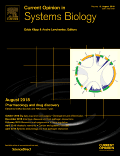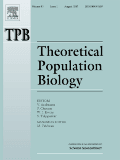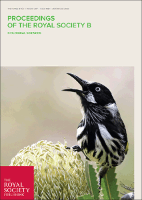
JOURNAL OF THEORETICAL BIOLOGY
Scope & Guideline
Bridging Theory and Application in Biological Sciences
Introduction
Aims and Scopes
- Mathematical Modeling of Biological Systems:
The journal publishes research that utilizes mathematical models to simulate biological phenomena, including population dynamics, disease spread, and ecological interactions. This includes both deterministic and stochastic models. - Theoretical Frameworks for Evolutionary Biology:
A core area of focus is on developing theoretical frameworks that explain evolutionary dynamics, including cooperation, kin selection, and the evolution of complex traits. - Interdisciplinary Approaches to Biology:
The journal emphasizes interdisciplinary research that combines insights from biology, mathematics, physics, and computer science to address complex biological questions. - Ecological and Environmental Dynamics:
Research on ecological modeling, including the effects of environmental changes on species interactions and community structures, is a significant area of interest. - Physiological and Biochemical Modeling:
Studies that focus on the physiological processes within organisms, including cellular interactions, metabolic pathways, and the impact of therapies on biological systems, are also prominent. - Applications of Theoretical Biology in Medicine:
The journal includes research that applies theoretical biology to medical contexts, such as modeling disease dynamics, treatment strategies, and understanding immune responses.
Trending and Emerging
- Complex Systems and Network Analysis:
There is a growing trend towards modeling complex biological systems using network analysis, focusing on interactions and dependencies among various biological components. - Machine Learning and Data-Driven Approaches:
The integration of machine learning techniques in biological modeling is on the rise, allowing for more robust predictions and insights based on large datasets. - Dynamic Modeling of Infectious Diseases:
Research on infectious disease dynamics, particularly in light of recent global health crises like COVID-19, has surged, emphasizing the importance of real-time data and response strategies. - Adaptive and Evolutionary Strategies:
Emerging research increasingly focuses on adaptive strategies and evolutionary game theory, exploring how organisms optimize their strategies in changing environments. - Microbiome and Host Interactions:
The exploration of microbiome dynamics and their interactions with host organisms is gaining attention, reflecting the importance of microbial communities in health and disease. - Environmental and Climate Change Impact Models:
Models addressing the impacts of climate change and environmental variability on ecological and evolutionary processes are becoming more prominent, highlighting the urgency of these issues.
Declining or Waning
- Classical Population Genetics:
Research focused on traditional models of population genetics has decreased, likely as newer, more integrative approaches that incorporate ecological and evolutionary dynamics gain traction. - Static Ecological Models:
The reliance on static models that do not account for temporal dynamics or feedback mechanisms in ecosystems appears to be waning, as researchers increasingly recognize the importance of dynamic modeling. - Simplistic Disease Models:
There is a noticeable decline in the publication of simplistic disease models that do not incorporate complexities such as host heterogeneity or environmental factors, as the field moves towards more nuanced and realistic representations. - Deterministic Approaches Without Stochastic Elements:
The use of purely deterministic models without consideration of stochastic processes has lessened, reflecting a growing acknowledgment of the role of randomness in biological systems. - Overly Simplified Behavioral Models:
Previous trends in publishing overly simplistic behavioral models are diminishing, as new research emphasizes the complexity of behavior and social interactions among organisms.
Similar Journals

BIOLOGICAL JOURNAL OF THE LINNEAN SOCIETY
Unveiling the intricacies of life through research.BIOLOGICAL JOURNAL OF THE LINNEAN SOCIETY is a prestigious, peer-reviewed journal published by Oxford University Press that serves as a leading platform for original research in the fields of ecology, evolution, behavior, and systematics. With its ISSN of 0024-4066 and E-ISSN 1095-8312, this journal has maintained an impressive Q1 ranking in the latest Scopus statistics, which firmly positions it among the top tier of journals in its category (ranked #197 out of 721). Established in 1969, it covers a broad range of topics crucial for understanding biodiversity and the evolutionary processes shaping it, with its coverage extended until 2024. Though it does not operate under an open-access model, it ensures wide visibility and dissemination of impactful research findings. The journal is key for researchers, professionals, and students dedicated to advancing knowledge in biological sciences, fostering interdisciplinary collaboration, and addressing pressing ecological challenges.

Journal of Biological Dynamics
Illuminating the pathways of ecological evolution and behavior.The Journal of Biological Dynamics is a pivotal open access publication, established in 2007 and published by Taylor & Francis Ltd, that caters to a broad field of inquiry within Ecology, Evolution, Behavior, and Systematics. With an ISSN of 1751-3758 and an E-ISSN of 1751-3766, this journal has garnered a respectable reputation, securing a Q2 ranking in both its primary categories according to the 2023 metrics. The journal aims to disseminate high-quality research that stimulates dialogue among ecological scientists, practitioners, and students while providing insightful analysis on biological dynamics. As part of its commitment to accessibility, it has been an open access publication since 2012, allowing free access to its rich repository of knowledge. Hailing from the United Kingdom, this journal not only provides a platform for original research but also contributes significantly to advancing ecological understanding through its innovative approach.

Annual Review of Ecology Evolution and Systematics
Advancing the Frontiers of Ecological and Evolutionary ScienceThe Annual Review of Ecology, Evolution, and Systematics, published by Annual Reviews, is a leading academic journal dedicated to advancing the understanding of ecological and evolutionary processes. With a commendable impact factor and impressive rankings—9th in both the Ecology, Evolution, Behavior and Systematics category and the Environmental Science category—this journal is recognized for its rigorous peer-reviewed articles that synthesize research findings across a wide range of topics within the fields of ecology and evolutionary biology. Established in 2003, this annual publication aims to provide researchers, professionals, and students with comprehensive insights into the latest developments and trends within these dynamic disciplines. By facilitating access to high-quality scholarly articles, the Annual Review of Ecology, Evolution, and Systematics continues to play a crucial role in fostering scientific discourse and discovery.

Current Opinion in Systems Biology
Fostering groundbreaking discoveries in systems biology.Current Opinion in Systems Biology is an esteemed academic journal published by ELSEVIER, focusing on the dynamic and interdisciplinary field of systems biology. Since its inception in 2017, the journal has made significant strides in disseminating cutting-edge research and innovative perspectives across various domains, including applied mathematics, biochemistry, and drug discovery. With an impressive impact factor reflecting its prominent position as a Q1 journal in multiple categories—including Applied Mathematics, Biochemistry, and Computer Science Applications—it serves as a vital resource for researchers, professionals, and students alike. The journal embraces a comprehensive approach to understanding complex biological systems, fostering a deeper insight into the interactions within biological and computational frameworks. This makes it an essential conduit for advancing knowledge and innovation in systems biology, facilitating the development of new methodologies that could lead to groundbreaking discoveries.

Systematic Biology
Championing innovative methodologies in biological research.Systematic Biology is a premier journal published by Oxford University Press, dedicated to advancing the field of systematic biology through rigorous research and comprehensive reviews. Established in 1952, this esteemed journal has become a cornerstone of scholarship in Ecology, Evolution, Behavior and Systematics and Genetics, consistently ranking in the Q1 category as of 2023. With an impressive Scopus ranking—19th in Ecology and Evolution and 23rd in Genetics—Systematic Biology offers a platform for the dissemination of groundbreaking research, novel methodologies, and critical discussions that shape our understanding of biological diversity and evolution. While the journal does not currently offer open access options, it maintains a strong commitment to quality and integrity in publishing, ensuring that every article contributes meaningfully to the scientific community. Researchers, professionals, and students alike will find valuable insights and a wealth of knowledge within its pages, supporting their work and fostering a deeper appreciation for the intricate web of life.

ACTA BIOTHEORETICA
Cultivating a Rich Repository of Interdisciplinary ResearchACTA BIOTHEORETICA is a distinguished academic journal published by Springer, offering a vital platform for the dissemination of research within various interdisciplinary fields including Agricultural and Biological Sciences, Applied Mathematics, Biochemistry, Genetics and Molecular Biology, Environmental Science, and Philosophy. The journal, with its extensive history since its inception in 1935, holds a significant impact factor within its respective categories, ranking Q2 in Agricultural and Biological Sciences and Q1 in Philosophy as of 2023. Its archives, spanning from historical publications to contemporary studies, serve as a rich repository for scholars, professionals, and students dedicated to advancing knowledge in these areas. ACTA BIOTHEORETICA invites contributions that push the boundaries of theoretical exploration and practical application, with the aim of fostering an understanding that bridges science and philosophy. Although not open access, the journal maintains wide accessibility through its integrated digital platforms, enhancing the reach and impact of published work worldwide. Its central office located in Dordrecht, Netherlands further accentuates its international appeal and significance.

Molecular Ecology Resources
Pioneering Discoveries in Molecular Ecology and BeyondMolecular Ecology Resources, published by WILEY, is a leading international journal that specializes in the intersection of molecular biology with ecology and evolution. With an impressive impact factor signified by its Q1 status in multiple categories, including Biotechnology, Ecology, Evolution, Behavior and Systematics, and Genetics for 2023, this journal stands as a reputable source of groundbreaking research within the fields of agricultural and biological sciences. Its Scopus rankings are particularly noteworthy, placing it in the top tier of its respective categories, demonstrating its significance in advancing our understanding of molecular ecology. The journal has been committed to fostering high-quality scientific discourse from 2008 to 2024 and offers open access options to enhance its visibility and accessibility. As a researcher, professional, or student in these dynamic fields, engaging with Molecular Ecology Resources means contributing to and staying informed about the latest innovations and methodologies that shape our understanding of the biological world.

AMERICAN NATURALIST
Decoding Nature’s Mysteries, One Article at a TimeAMERICAN NATURALIST, published by University of Chicago Press, stands as a premier outlet for scholarly research in the fields of ecology, evolution, behavior, and systematics. With an impact factor that reflects its high citation rate, the journal has garnered a reputation within the academic community, evidenced by its placement in the Q1 category of its discipline in 2023 and an impressive Scopus rank of #135 out of 721 journals, positioning it in the 81st percentile for Agricultural and Biological Sciences. The journal, established in 1946, continues to uphold its commitment to advancing scientific knowledge through rigorous peer-reviewed articles. Researchers and professionals will find AMERICAN NATURALIST an essential resource, providing insights and discussions that illuminate complex biological phenomena, while fostering a deeper understanding of the natural world. As an essential reading for students and seasoned experts alike, its curated body of work encourages innovative thinking and exploration across an array of ecological and evolutionary topics.

THEORETICAL POPULATION BIOLOGY
Decoding Population Biology through TheoryTHEORETICAL POPULATION BIOLOGY is a leading academic journal published by Academic Press Inc. Elsevier Science, dedicated to advancing the understanding of population biology through theoretical frameworks and models. With an ISSN of 0040-5809 and an E-ISSN of 1096-0325, this journal has been a cornerstone in its field since its inception in 1970. Recognized for its significant contributions to the study of ecological and evolutionary dynamics, it currently holds a Q2 ranking in the Ecology, Evolution, Behavior and Systematics category as per the 2023 category quartiles. Researchers and professionals alike appreciate its role in disseminating impactful findings, as reflected in its percentile ranking of the 51st in Scopus for the Agricultural and Biological Sciences field. While the journal is not open access, it remains a vital resource for those looking to deepen their knowledge and research in theoretical approaches to population biology, making it an essential read for students, aspiring scientists, and veteran researchers seeking to engage with cutting-edge theoretical developments.

PROCEEDINGS OF THE ROYAL SOCIETY B-BIOLOGICAL SCIENCES
Bridging Disciplines for Scientific ExcellencePROCEEDINGS OF THE ROYAL SOCIETY B-BIOLOGICAL SCIENCES, published by the esteemed Royal Society, stands as a premier platform for disseminating cutting-edge research in the fields of Biological Sciences. With an impressive impact factor reflective of its high citation rates and scholarly contributions, this journal encompasses a wide array of disciplines, including Agricultural and Biological Sciences, Biochemistry, Genetics and Molecular Biology, Environmental Science, and Immunology and Microbiology, consistently ranking in the Q1 category across these fields. Since its inception in 1946, it has been committed to advancing our understanding of biological systems and informing evidence-based practices. Researchers and academics can submit their work without the Open Access barrier, thereby maintaining the integrity of the disciplinary discourse while providing comprehensive insights. The journal's location in the United Kingdom also positions it at the heart of global scientific innovation, making it a vital resource for professionals and students alike who are eager to explore the latest trends and breakthroughs in the biological sciences.